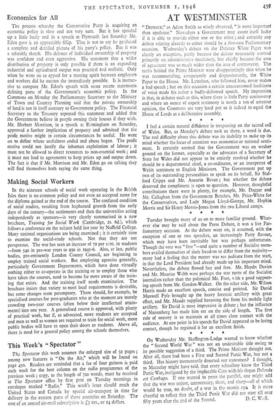Economics for All
The process whereby the Conservative Party is acquiring an economic policy is slow and not very sure. But it has speeded up a little lately and in a speech at Plymouth last Saturday Mr. Eden gave it an appreciable fillip. That is not to say he produced a complete and detailed picture of his party's policy. But it was a tolerable sketch. His defence of individual ownership of property was confident and even aggressive. His statement that a wider distribution of property is only possible if there is an expanding industrial and agricultural output was practical and realistic. Only when he went on to appeal for a trusting spirit between employers and workers did he outrun the immediately possible. It is instruc- tive to compare Mr. Eden's speech with some recent statements defining parts of the Government's economic policy. In the Commons on Monday the Parliamentary Secretary to the Ministry of Town and Country Planning said that the private ownership of land is not in itself contrary to Government policy. The Financial Secretary to the Treasury repeated this statement and added that the Government believe in people owning their houses if they wish. Mr. Herbert Morrison, in a speech at Birmingham on Saturday, approved a further implication of property and admitted that the profit motive might in certain circumstances be useful. He went on to define where usefulness ended and abuse began. The profit motive could not justify the inhuman exploitation of labour ; it must not be allowed to direct resources to non-essential work ; and it must not lead to agreements to keep prices up and output down. The fact is that if Mr. Morrison and Mr. Eden go on talking they will find themselves both saying the same thing.


































 Previous page
Previous page